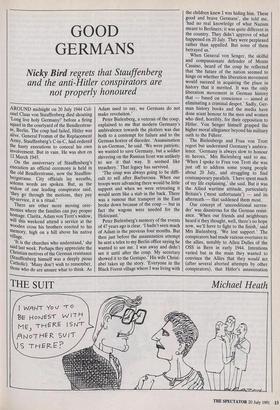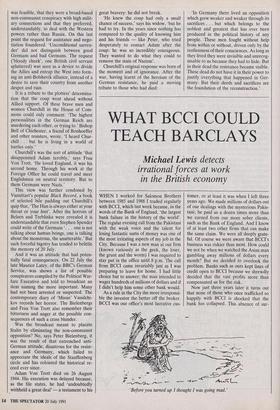GOOD GERMANS
Nicky Bird regrets that Stauffenberg
and the anti-Hitler conspirators are not properly honoured
AROUND midnight on 20 July 1944 Col- onel Claus von Stauffenberg died shouting `Long live holy Germany!' before a firing squad in the courtyard of the Bendlerstras- se, Berlin. The coup had failed, Hitler was alive. General Fromm of the Replacement Army, Stauffenberg's C-in-C, had ordered the hasty executions to conceal his own Involvement. But in vain. He was shot on 12 March 1945.
On the anniversary of Stauffenberg's execution an official ceremony is held in the old Bendlerstrasse, now the Stauffen- bergstrasse. City officials lay wreaths, solemn words are spoken. But, as the Widow of one leading conspirator said, they go through the motions, they pay hp-service, it is a ritual.'
There are other more moving cere- monies where the families can pay proper homage. Clarita, Adam von Trott's widow, will this weekend attend a service at the Wooden cross his brothers erected to his memory, high on a hill above his native village.
`It is the churches who understand,' she said last week. Perhaps they appreciate the Christian motives of the German resistance (Stauffenberg himself was a deeply pious Catholic). 'Many don't wish to remember, those who do are unsure what to think. As Adam used to say, we Germans do not make revolution.'
Peter Bielenberg, a veteran of the coup, explained to me that modern Germany's ambivalence towards the plotters was due both to a contempt for failure and to the German horror of disorder. 'Assassination is un-German,' he said. 'We were patriots; we wanted to save Germany, but a soldier shivering on the Russian front was unlikely to see it that way. It seemed like treachery.' That legacy has survived. `The coup was always going to be diffi- cult to sell after Barbarossa. When our troops were advancing there would be little support and when we were retreating it would seem like a stab in the back. There was a rumour that transport in the East broke down because of the coup — but in fact the wagons were needed for the Holocaust.'
Peter Bielenberg's memory of the events of 47 years ago is clear. 'I hadn't seen much of Adam in the previous four months. But then just before the assassination attempt he sent a telex to my Berlin office saying he wanted to see me. I was away and didn't see it until after the coup. My secretary showed it to the Gestapo.' His wife Christ- abel takes up the story. 'Everyone in the Black Forest village where I was living with the children knew I was hiding him. These good and brave Germans', she told me, tad no real knowledge of what Nazism meant to Berliners; it was quite different in the country. They didn't approve of what happened on 20 July. They were perplexed rather than appalled. But none of them betrayed us.'
When General von Senger, the skilful and compassionate defender of Monte Cassino, heard of the coup he reflected that 'the future of the nation seemed to hinge on whether this liberation movement would succeed in acquiring the place in history that it merited. It was the only liberation movement in German history that — based on conscience — aimed at eliminating a criminal despot.' Sadly, Ger- man history books and the media have done scant honour to the men and women who died, horribly, for their opposition to Hitler. Von Senger himself grasped the higher moral allegiance beyond his military oath to the Fiihrer.
The Bielenbergs and Frau von Trott regret but understand Germany's ambiva- lence. 'Germany is always slow to honour its heroes,' Mrs Bielenberg said to me. `When I spoke to Frau von Trott she was just off to address some young people about 20 July, and struggling to find contemporary parallels. 'I have spent much of my life explaining,' she said. But it was the Allied wartime attitude, particularly Britain's (`most unfortunate') — and its aftermath — that saddened them most.
Our concept of 'unconditional surren- der' was disastrous for the German resist- ance. 'When our friends and neighbours heard it they thought, well, there's no hope now, we'll have to fight to the finish,' said Mrs Bielenberg. 'We lost support.' The conspirators had made various overtures to the allies, notably to Allen Dulles of the OSS in Bern in early 1944. Intentions varied but in the main they wanted to convince the Allies that they would act (after several aborted attempts by other conspirators), that Hitler's assassination was feasible, that they were a broad-based non-communist conspiracy with high milit- ary connections and that they preferred, understandably, to deal with the Western powers rather than Russia. On this last point the request for assistance and nego- tiation foundered. 'Unconditional surren- der' did not distinguish between good Germans and bad Germans. The request ('bloody cheek', one British civil servant spluttered) was seen as a device to divide the Allies and entrap the West into form- ing an anti-Bolshevik alliance, instead of a desire to save their country from another despot and ruin.
It is a tribute to the plotters' determina- tion that the coup went ahead without Allied support. Of these brave men and women Churchill in the House of Com- mons could only comment: 'The highest personalities in the German Reich are murdering each other, or trying to.' Bishop Bell of Chichester, a friend of Bonhoeffer and other resisters, wrote, 'I heard Chur- chill . . . but he is living in a world of battles only.'
Churchill's was the sort of attitude 'that disappointed Adam terribly,' says Frau Von Trott. 'He loved England, it was his second home. Through his work at the Foreign Office he could travel and meet Englishmen on neutral territory. But to them Germans were Nazis.'
This view was further condoned by Vansittart's popular Black Record, a book of selected bile padding out Churchill's quip that, 'The Hun is always either at your throat or your feet'. After the horrors of Belsen and Treblinka were revealed it is understandable that even Stephen Spender could write of the Germans . . one is not talking about human beings, one is talking about the monstrous, the unutterable.' But such forceful bigotry has tended to belittle the memory of 20 July.
And it was an attitude that had poten- tially fatal consequences. On 22 July the late Maurice Latey, of the BBC's German Service, was shown a list of possible conspirators compiled by the Political War- fare Executive and told to broadcast an item naming the more important. Many had not been arrested or suspected. The contemporary diary of `Missie' Vassilchi- kov records her horror. The Bielenbergs and Frau Von Trott also remember their bitterness and anger at the possible con- sequences of such a crass blunder.
Was the broadcast meant to placate Stalin by eliminating the non-communist opposition? No, says Peter Bielenberg, it was the result of that entrenched anti- German attitude, disastrous for the resist- ance and Germany, which failed to appreciate the ideals of the Stauffenberg circle and has coloured the historical re- cord ever since.
Adam Von Trott died on 26 August 1944. His execution was delayed because, as the file states, he had 'undoubtedly withheld a great deal' — a testament to his great bravery: he did not break.
`He knew the coup had only a small chance of success,' says his widow, tut he had to try. In the years since nothing has compared to the quality of knowing him and his friends — like Peter, who tried desperately to contact Adam after the coup: he was so incredibly courageous. They wanted to do what they could to remove the stain of Nazism'.
Churchill's original response was born of the moment and of ignorance. After the war, having learnt of the heroism of the German resistance, he paid a moving tribute to those who had died: `In Germany there lived an opposition which grew weaker and weaker through its sacrifices . . . but which belongs to the noblest and greatest that has ever been produced in the political history of any people. These men fought without help from within or without, driven only by the restlessness of their consciences. As long as they lived they were invisible and unrecog- nisable to us because they had to hide. But in their dead the resistance became visible. These dead do not have it in their power to justify everything that happened in Ger- many. But their deeds and sacrifices are the foundation of the reconstruction.'



















































 Previous page
Previous page